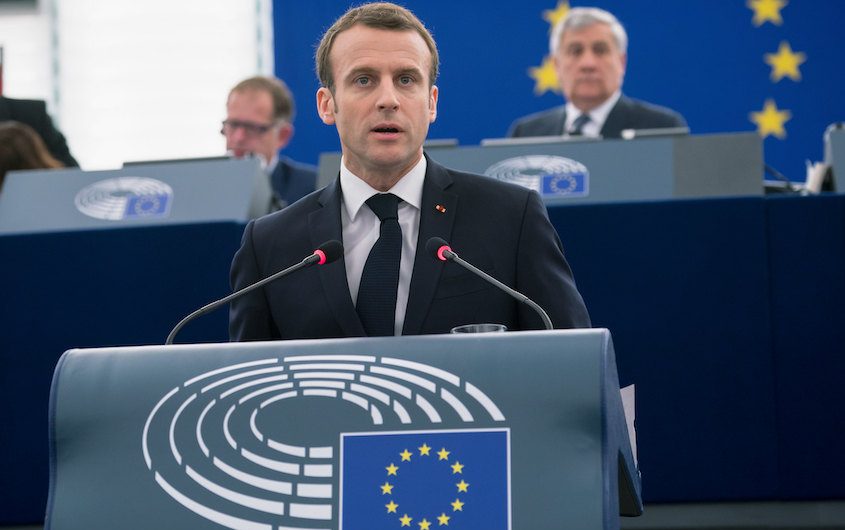
European Parliament via Flickr
The 2022 French Presidential Elections

Francesca Vassallo
University of Southern Maine
Dr. Francesca Vassallo is a Professor of Political Science in the Political Science Department at the University of Southern Maine. Her research interests and publications have focused on conventional and unconventional political behavior, French and European politics, European public opinion, U.S.-EU relations, and protest action. In addition to journal articles and book chapters, her book France, Social Capital and Political Activism (Palgrave) came out in 2010. She has been the guest editor of special issues of the journals PS: Political Science & Politics, Partecipazione e Conflitto, and German Politics and Society. She is currently working on an edited volume on Youth Political Action Worldwide and a book on France in the European Union. She was awarded a visiting fellowship from the Centre for European Studies of the Australian National University (2015), a visiting research position at the Center for the Study of Democracy of the University of California Irvine (2016), and an Europa Policy Lab Fellowship from the Centre for European Studies of the Australian National University (2018-9). She has lectured and given presentations in her field of research at universities, public opinion forums, and government agencies in many countries, from North America to Europe and Australia.
Professor Vassallo received her PhD in Government from Georgetown University (2002), her MA in German and European Studies from Georgetown University (2000), her MA in International Affairs from American University (1996), and her BA in Political Science from the University of Padoa (Italy) (1993).
A Second Term for Macron the European
French President Emmanuel Macron won a second term in office on April 24th, after defeating Marine Le Pen for the second time in five years. While the incumbent’s victory was less impressive this time, with only 58.55 percent of the votes in the second round, Macron’s new term suggested a renewed support for European engagement among French voters. Europe was a top concern in the minds of voters in 2017, but the recent election has also clearly addressed policy issues tied to European decisions: purchasing power, the environment, and welfare. Despite the struggles across the European continent during his first term, President Macron has convincingly defended EU membership, European policies, and collaboration with European and American allies at the core of his campaign to defeat a far-right candidate in the second round of the elections. If Macron’s victory may have seemed easy after all the votes were counted, Marine Le Pen’s new economic populist strategy and tough-on-crime-and-immigrants campaign points helped her win about 3 million more votes this time around. This type of result has highlighted some of the progress the nationalist candidate made in France, following similar advances by other extreme right candidates in Europe. In the eyes of many observers, the second round of the French presidential elections represented once again a duel between pro-EU and anti-EU politicians.
Spring 2022 has turned out to be an extremely busy first semester of the year for the French President: France holds the rotating presidency of the European Union until June 2022; Macron ran in the presidential election and campaigned for the two expected rounds of votes; the French president has engaged in shuttle diplomacy between European capitals and Moscow; and the French legislative elections are scheduled for mid-June. This year so far could have decided Macron’s political legacy in many ways, yet the youngest French president of the Fifth Republic has managed to score multiple victories. His Europhile persona has been clear since the beginning of his presidency and has remained consistent during five years of crises: social turmoil from the Yellow Vest movement due to changes to national welfare policies, several COVID-imposed lockdowns and vaccine mandates, higher inflation and lower purchasing power, and the first aggression war on the European continent (with a Russian invader!) since World War II. Yet, some of these crises have actually helped Macron win reelection. His approval ratings in 2019 were quite low (15 percent in February 2019), until COVID-related health policies in 2020-2021 reenergized his support among French voters again (30 percent in March 2022). In a similar way, the Russian invasion of Ukraine in February 2022 showcased his diplomatic skills, with French voters selecting him as the better candidate to deal with the war. As a convinced European and the president of a country preparing the agenda for the European Council meetings, Macron reveled in the international spotlight. His limited engagement with French voters before the first round of the elections was noticed, and Macron changed his strategy for the second round with more face-to-face contact with Frenchmen across the country to undermine his opponent’s attacks of being a candidate for the elites (national and European that is).
Marine Le Pen’s previous ‘out of the Eurozone’ proposal was not well received by most French voters, even in the wake of Brexit. Her 2022 campaign priorities focused more on specific policy proposals rather than anti-EU venom.
For the record, it was possible for Le Pen to win, but it still remained unlikely. Whereas Marine Le Pen ran a better campaign this second time, the list of top concerns among voters helped her candidacy more than in 2017. Her previous ‘out of the Eurozone’ proposal was not well received by most French voters, even in the wake of Brexit. Her 2022 campaign priorities focused more on specific policy proposals rather than anti-EU venom. In many ways, Le Pen borrowed economic policies from the extreme left in the country, talking to the needy, the working-class people who felt left behind by the French establishment of a Macron banker and globalization ally. The 2022 version of Marine Le Pen proved to be less of an EU-basher and more of a populist leader looking for angry voters, with a consistent touch of xenophobic, anti-immigrant positions.
In the end, the elections demonstrated again how Macron is a pragmatist, who can debate a policy program on its merits, whether they may be economic, social, or political, at the national and European levels. It is his objectivity away from ideology that has aided his relationships with other countries. Macron’s victory was in fact welcomed by most countries in Europe. From the Italian Prime Minister to the German Chancellor, from the European Commission President to the European Council President, leaders on the continent approved of his policy positions in Europe and his availability to negotiate with anyone. More than ever, EU leaders needed a stable French policy toward Europe to face the many challenges ahead. French voters listened and opted for stability over change. A Le Pen victory would have prevented a smooth functioning of EU institutions, although the current problems with Viktor Orbán have not stopped EU successes.
France is guaranteed a stable government with a clear plan of execution for the next five years. The real question now is: what will happen in 2027 when Macron the European will not be able to run for a third term.
The best accomplishment of the French presidential elections is that European countries now know who to deal with for the next five years, and this is more stability than many of the other EU member states with parliamentary systems can guarantee after an election. The European Union, including Germany, and the United States can count on an open line of communication with the French capital. The Franco-German engine in Europe can continue to function as expected. There is no guarantee that French positions will always endorse proposals from European allies, but Macron’s victory has certainly reassured many political leaders of the collaborative environment in Europe, in particular with regard to specific key policy issues at the moment: climate change, democracy protection, and defense priorities.
With Macron at its helm and a possible new legislative majority for the president’s party (La République en Marche) in June, France is guaranteed a stable government with a clear plan of execution for the next five years. This is what any ally would want to have when dealing with another country. The real question now is: what will happen in 2027 when Macron the European will not be able to run for a third term.







